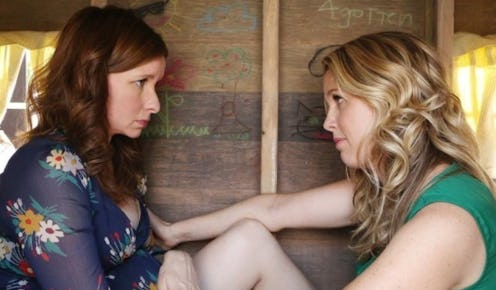Entertainment
'Playing House's Dynamic Portrayal of Lady BFFs

There's something oddly magical and freeing about seeing what was once blanketly considered the weird and sometimes intense bonds that thread together a female best friendship, normalized. In recent years thanks to films like Bridesmaids and shows like Broad City , we as a culture are starting to not only see best female friends represented on screen at all, but we're also taking a deeper dive into what makes the world of female friendships just as rife with comedy as the boys of bromance. Which is why USA's Playing House is one such gem — and exactly the sort of comedy this brave new world of defining life for yourself needs.
While Broad City focused its first season on figuring it all out and Bridesmaids dealt with new beginnings, Playing House sat itself comfortably in the adult family stuff arena, preferring to hit us with the hard, real-life-shit stuff and how female friendships not only survive, but thrive, in these most challenging of circumstances and, yes, are just as funny as their slightly younger counterparts. Platonic love is real and doesn't have to be slightly sexualized just because, haha, sex stuff. It's so much more than that.
Listen: women will be the first ones to tell you that female friendships are a strange and mystical beast — they are just as intimate and important as your sexually laced romantic relationships, and therefore often hard to accurately portray. (Especially if there isn't a woman involved in the creation and execution on the backend. Cough.) This makes it even harder still for our society to accept as anything more than moments of shrieking absurdity because the nuance can so often be lost in favor of eyeroll-inducing jokes about how ca-razy us ladies be.
And while yes, there may from time to time be a few bouts with hysteria going on (though there's PLENTY OF THAT in male friendships, too — they just like to machismo it up), there's often a lot more than that abhorrent white noise treatment so many on-screen depictions tend to receive.
Within the relationship of Maggie (Lennon Parham) and Emma (Jessica St. Clair) we see not just how, but why, people that look diametrically opposed on the surface need each other. It's all about providing each other with much-needed perspective. Maggie and Emma are polar opposites in many ways. So often, when viewed from the male point of view — the default POV of our culture — our actions and behaviors within the realm of female friendship begets the question "Why are you two even friends? It's like you don't even like each other."
This is something that our culture rarely answers all that well. Old tropes of "Oh, because shopping!" or "Well, because history and childhood or whatever!" aren't the answer. And it's a disservice to friendship to reduce it as such. Playing House regularly pushes against that ideas through its humor, and Maggie and Emma's obvious care for one another as people outside of the things they have in common. Their bond of friendship goes far, far deeper, as evidenced by the way their opinions and actions fluctuate and evolve from moment to moment. Because they feel and allow themselves to feel, and are comfortable and secure enough in their friendship to allow their opinions and outlook to change. Likely out of fear of losing a through-line on who these characters are, most shows and movies aren't comfortable showing or attempting to explain that in visual mediums like television and movies. But perspective is truly everything.
Where St. Clair and Parham's strength as comedians and writers lies, is in their ability to write interestingly and refreshingly frank humans who just so happen to be women, and allowing the little moments to provide a window in their clearly vast and rich history. This makes them infinitely relatable beyond the dreck that often results because of long-held "boys vs. girls" comedy separatism. The duo have a history of this (R.I.P. Best Friends Forever), but considering the world of unknowns and new, varied ways of living that is our time now, these scenarios are far more universal in their very funny and competent hands, particularly now.
Being misguided, excited, unsure, a little emotionally volatile, doing outlandish things — these are not boys' only territory. And they don't stop after you find "the one" or some person to settle down with. Playing House tears down those ideals we've long been too comfortable with and shows how truly great friendships are the cornerstone to surviving our web-like and grey-area world. There's more to all of us and our friendships, and Playing House is showing all of that in all of its weird and foreign (entertainment-wise) glory — normalizing the idea that nothing is really normal. Not anymore.
Images: USA Network